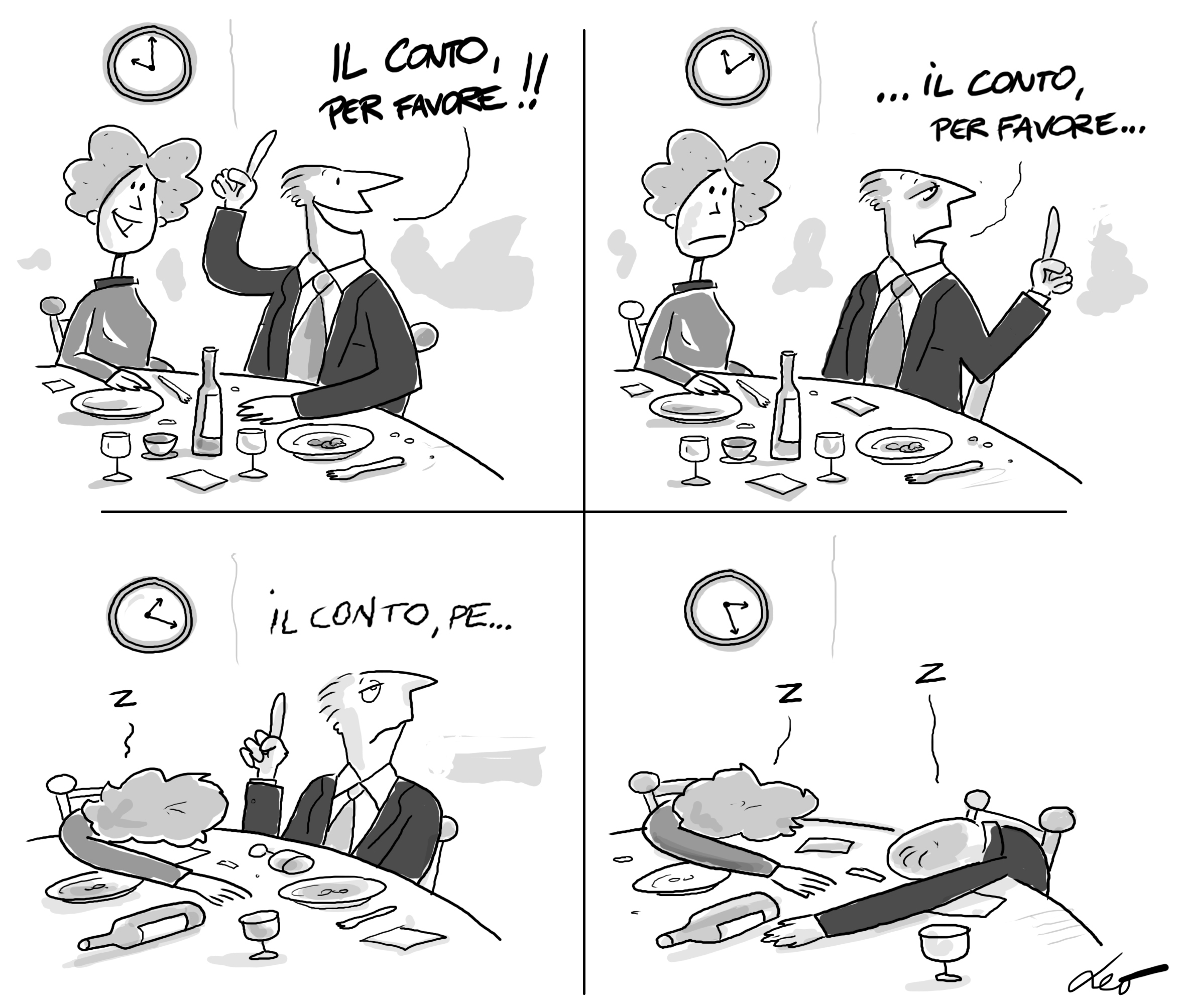“Il conto per favore.” That’s how you ask for the bill in Italian. And now that you know, you might as well forget it. It’s not worth your brain space. You can ask for the bill in restaurants in Italy, but most likely, no one will bring it to you. Why? Well, because, around here, bills are brought at midnight. To receive the cheque anytime before Cinderella’s curfew is considered insulting because Italians go to restaurants for the table space as well as for the food.

“Italian flats are small and space for meeting friends is limited. Going out to eat is like renting space to talk,” my friend Marco explained. In response, I smiled. We were sitting at a table in our favourite Florentine trattoria, and although it certainly has a lot to boast about, space is not one of its strong points. If it were space we were renting by dining out, we certainly weren’t getting our money’s worth. Most nights we were forced to sit with other diners, at a table that was hardly suited for two in the first place.
But no worries. Italy has taught me a lot about the art of inevitability. When dining in this country, certain things are inevitable. No matter the restaurant, you’ll almost always find too many tables crowding the floor space, no conto per favore until closing time, and waiters who don’t give their customers the time of day.
But before you rush to defend your favourite cameriere, let me explain. Italian waiters are highly qualified and very competent. Most will briskly bring your plates of fried zucchini flowers and pecorino stagionato with fig jam and not have to ask who ordered what. They can even do it without having to write your order down. They simply have a feel for what each person looks like they should be eating. Still, camerieri are often so abrupt and serious in their serving style, that diners new to Italian eating, despite being paying customers, often feel that they are somehow imposing.
I mentioned this idea to Marco and he scoffed, “Waiters aren’t here to be your friends. They’re here to serve you quality food at the right temperature and in the right order.”
“Fine,” I argued, “But why do they have to make you feel like you’re disturbing them?”
“At least they don’t sing like all the waiters in Los Angeles do. It’s enough to make you lose your appetite. On my last trip, in every restaurant I went to, my meal was interrupted by waiters singing the happy birthday song at the top of their lungs. Do they have to be song-birds to get hired over there?”
“Well no, waiters in L.A. aren’t singers. They’re actors.”
“Ah,” my friend nodded, “So that’s why they all smile with thirty-two teeth and tell you their name. They’re hoping to find an agent at one of their tables.”
I laughed, “They try to be nice so people will leave a big tip.”
Marco was unconvinced, “But what do I care what the waiter’s name is?”
“You are a snob,” I told him. It was an insult that he didn’t find insulting in the least. In this city, there is prestige in snobbery, so I was forced to try a different tactic. “At least American waiters don’t disappear from the face of the earth in the middle of your meal like Italian ones do.”
Marco laughed. “In Italy, we pay our waiters to disappear. We don’t pay them to ask us annoying questions or tell us about their favourite opera stars. Everywhere I went in California, as soon as the waiters found out I was Italian, they would tell me how much they liked Pavarotti.”
“You’re exaggerating.”
“No. I go out to eat for a little privacy. If I wanted someone breathing down my neck, I would have stayed at home.”
“Part of the fun of eating out is to have the waiter talk to you.”
“If I wanted to answer questions during dinner, I would have gone to my mother’s. But why are you obsessing about the waiter? Do you want to have dinner with him?”
“No, but if you’re feeling threatened and want to get rid of him, all you have to do is say, ‘il conto per favore.’ He’ll never come back again.”
It was a memorable moment. For once, my friend had no comeback. For once, I had won a Florentine debate. And believe me, it is better than being treated to dinner.








